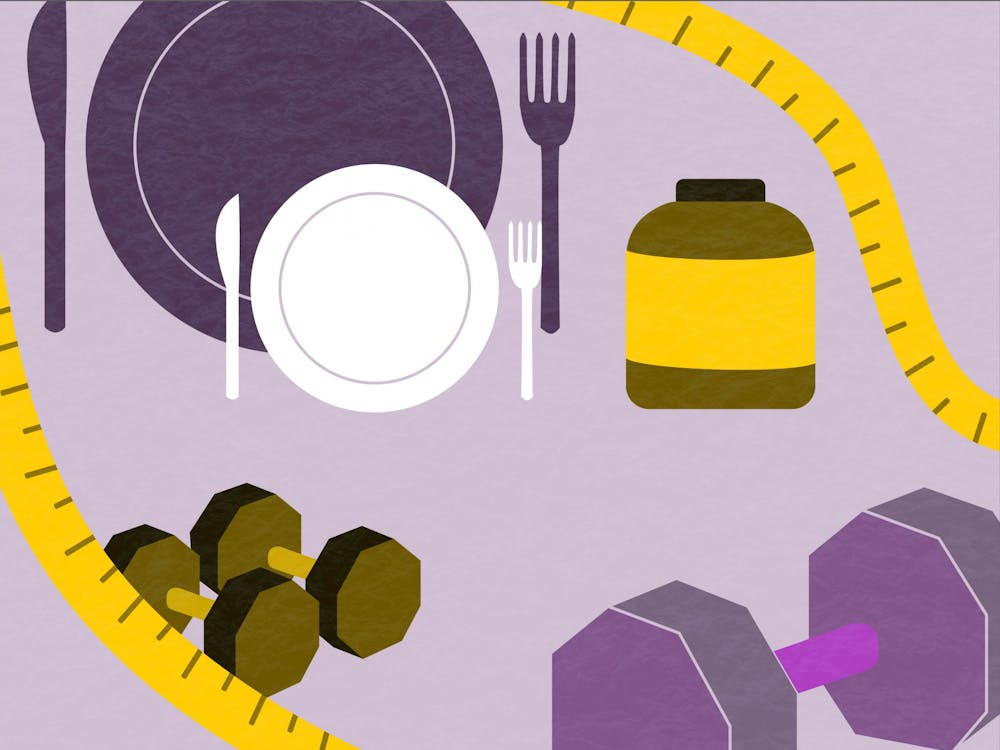In a world dominated by physical judgment, many men are victims of their own conjecture. With one of the world’s largest international bodybuilding competitions happening this month, it is important to acknowledge the reality of men’s fitness and physique, as well as the mental implications it has caused.
It is not uncommon for young men to take their health and appearance seriously. In a way, society has told them that attractive guys have broad shoulders, slim waists and heavy legs. In order to obtain this body type, they are told that it requires dedication to their diet and extensive work in the gym. There's nothing wrong with someone’s desire to have their dream body, but when does it become a threat to their personal well-being?
Professional bodybuilders care a lot about what they do. They follow strict training regiments and eating habits around the time of competitions because they have a strong passion to win. Most professional bodybuilders aim to compete in the Mr. Olympia Contest, held annually. The competition highlights the best of the best and awards the title of Mr. Olympia to the competitor with the best physique. Thousands of people around the world pay to watch these men and women compete and to witness the crowning of the year’s Mr. Olympia.
Bodybuilding has grown from being mainly a spectator event to a lifestyle choice for the younger generations. As much as it is a historically competitive sport, many young men take the behaviors of these professionals and apply them to themselves so that they can achieve the “ideal body.” While there are many individuals who bodybuild safely with confidence and a strong understanding of their body, there are others who fail to understand that everyone's body is different. These men struggle with their body image and eating habits. Diets focused on the consumption of high protein and clean macros often have them struggling to balance what foods they deem “healthy” and “unhealthy”, resulting in disordered eating.
“[Disordered eating] can lead to a more harmful eating disorder if left unchecked," Eating Disorder Hope said. Societal pressures, as well as the influence of social media, have convinced both teens and adults that the only way to achieve their ideal, aesthetic physique is to be as strict as possible. Meal prepping and counting macros is a great way to make sure you’re consuming a well-rounded diet daily, but it can easily cross the line into something much worse.
While not yet recognized as an eating disorder by the American Psychiatric Association, Orthorexia Nervosa (ON) is defined as, “a pathological fixation with consuming proper nutrition characterized by an obsessional adherence to strict dietary regimens." ON is seen through symptoms such as obsessions with food labels/nutrition facts, extreme interest in other people’s diets, restrictive eating and more. Although healthy eating is an excellent method of achieving athleticism, disordered eating can negatively impact an individual’s results and cause them more psychological harm. For example, those who are dieting to lose weight may not eat enough calories each day, resulting in fatigue and dangerous changes in metabolism.
Former Colorado University Football Player, Patrick Devenny, shared his story of disordered eating with Global Sport Matters back in 2019. Devenny’s internal battle started around his sophomore year of college and stuck with him even after he graduated. Despite the constant compliments about his body and dedication to working out, he struggled with his eating habits and insufferable mentality in private. “I would literally avoid my best friend’s birthday party because I could not eat during those hours… I knew that if I went, I would have to explain my diet or make up a lie.” The development of avoiding eating and a restrictive lifestyle can manifest from disordered eating to an eating disorder expeditiously. Athletes and bodybuilders do what they do with their bodies and diets because it is their profession. These men exist in an industry of disordered eating and physical judgment so that they can build their careers, get sponsorships and, overall, make money. Devenny details the importance of physique during the NFL draft: “If you show up to the league looking like a gladiator, you literally just made a couple hundred thousand dollars just by first impressions,” he says.
Although the bodybuilding industry is highly respected, is it really okay to subjectively compare yourself to other people at the gym? In the past couple of years, the environment that this industry has created is now perceived as an attainable way of life by young men. On platforms like Instagram and TikTok, influencers advocate strict lifestyle choices to young audiences that have no intentions of training competitively while also actively trying to attain these habits. These platforms are filled with impressionable young boys who see physique as a way to be respected by others, causing them to form false ideas of body image expectations.
President of the Gamecock Barbell Club, J.J. Bishop explains that there has definitely been a shift in how individuals view themselves. He believes that the accessibility to the internet has made it easier for people to compare themselves to others than it is to acknowledge their own growth and progress. Young boys who feel motivated by fitness influencers and pro bodybuilders are at risk for unintentionally harming themselves with disordered eating, over-exercising and possibly even using steroids.
The Journal of Clinical Endocrinology & Metabolism said, “steroid use in teens is of concern, especially since the hormonal systems they interact with play a critical role in brain development during these years." Many young males begin using steroids because they suffer from a form of Body Dysmorphia known as Muscle Dysmorphia, which is defined by the National Institute of Drug Abuse as “a preoccupation with the perceived inadequate size of their muscles.” Symptoms usually include extended thought regarding the size of one’s muscles, excessive weight training and avoiding body exposure situations.
Muscle Dysmorphia and Orthorexia Nervosa are similar in many ways, and put together they can place a heavy toll on an individual's mental state and can cause severe anxiety. Bishop mentioned that within the Gamecock Barbell Club, they are aware that weightlifting athletes struggle with these issues more often than not. He explains that he and the other officers make it a priority to create a strong sense of community so that members can feel safe if they need to vocalize their struggles. Establishing a safe environment for others is extremely important as most individuals fight with themselves internally because they feel alone and isolated. Heavy weightlifting and anabolic steroid use during adolescence and early adulthood result in a number of mental and physical issues, which can be hard for younger people to understand. Adolescents are sucked into environments online that promote lifestyles that they are not yet cognitively prepared for.
There is no one to blame for this phenomenon among males in the fitness and bodybuilding communities. The progress of professionals is so vivid through social media nowadays that it inspires men everywhere to drastically ‘better themselves.' If you or someone you know is suffering from disordered eating or body image issues, call (888)224-8250 or reach out to USC Wellness Services.
If you are interested in joining the Gamecock Barbell Club, find them on Garnet Gate or email them here!



